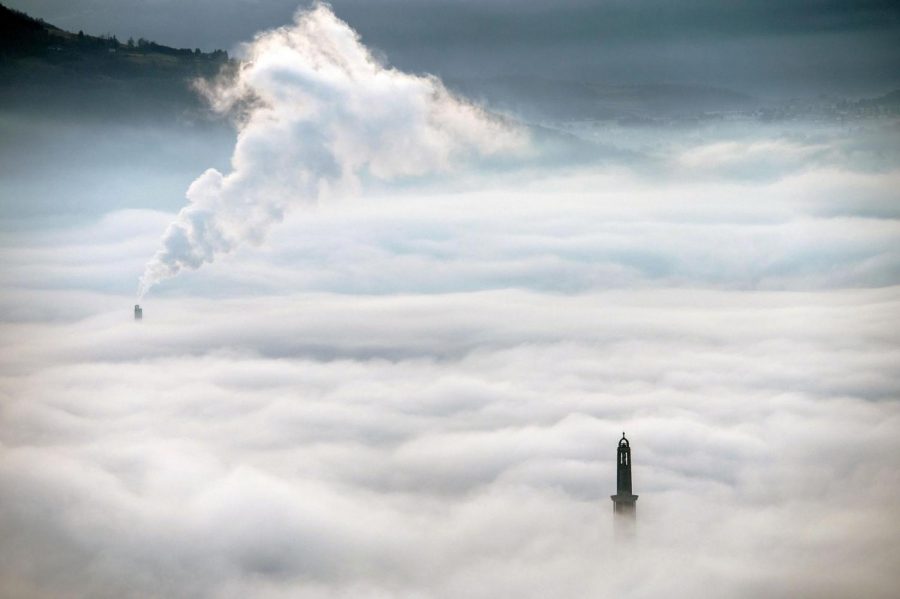Worldwide shutdown amidst pandemic allows Earth to breathe
Courtesy of National Geographic
Since everyone has been in lockdown during the coronavirus and is using less transportation, pollution in the sky has cleared.
May 21, 2020
For decades, a polluted cloud has loomed over China and murky waters have filled Venice’s canals. But recently, both the skies and the waterways have begun to clear up, leaving beautiful and clean cities. If everyone is determined enough, we can keep it this way.
It’s ironic that these positive changes are happening because of the worldwide Coronavirus pandemic that has killed thousands of people, and left many more suffering. Countries have instituted social distancing and lockdown measures to stop the virus from spreading. This virus has led countries and states to halt public and private forms of transportation, and has forced businesses of all kinds to close.
The quarantine and its effects have cut toxic emissions from cars, buses, trains and planes, as well as pollution from factories and manufacturers. Although these regulations have been difficult for people and the economy, Mother Nature appears to love them.
According to a Mar. 2020 Blue Zones article, “Having so much less traffic and manufacturing is giving the Earth a chance to breathe and heal, at least temporarily. A literal breather.”
This virus has given the environment time to thrive again.
“With factories shutting down and less transportation running, there have been significant drops in the greenhouse gases and air pollution in the atmosphere in many big cities,” junior and officer of Churchill for Climate club Claire Fan said. “However, I definitely think these changes are temporary and we might see an unfortunate bounce back for these measures when everything is up and running again.”
Let’s hope humanity can keep moving forward for a healthy planet. Although the most likely outcome is that everything returns to the way it was, it would be great if people could remember even the smallest ways to make a difference. Communities have the power to make a change, and should not lose motivation to “go green” as life returns to “normal.” Humanity has the capability to change the environmental meaning of the word “normal” from ‘polluted’ to ‘healthy.’
“I think the coronavirus has been a big eye opener for us all. It has really shown us that we can live with what we have and our consumer culture is truly deteriorating our earth,” Fan said.
The Churchill for Climate club does many things during the school year to raise money and awareness about the environment.
“Starting in Sept., we rallied in the Climate Walkout. In Dec., we hosted a film screening of ‘Racing Extinction,’ an environmental film that raises awareness of the global impact of climate change,” Fan said.
Churchill for Climate also participates in the Polar Plunge, an annual fundraiser where members jump into an ice cold lake. This year, participants raised more than $3,800 for the Chesapeake Climate Action Network. The Club’s current project is to bring composting to the WCHS school cafeteria. These small but powerful programs demonstrate ways that club members fight for what they believe.
“I try to make daily impacts by buying local, reducing meat consumption and of course the ‘reduce, reuse, recycle’ concept many from my generation grew up with in school. I also teach to help others understand our interconnectedness and to work through environmental misconceptions,” science teacher Mrs. Bewernitz said. “You can be a radical environmentalist leading a global charge or simply an ordinary citizen who tries to make daily choices as best you can, but knowledge is so important for either of those choices, so I teach.”
If you are not involved in the Churchill for Climate club or other environmental groups, or do not have spare time or money to spend on these clubs, there are still many ways to conserve individually. Doing something on your own, such as avoiding plastic straws, reusing or donating old clothing, carpooling, using reusable bags when shopping, turning off the lights when you are not using them, turning the water off while brushing your teeth, taking a shorter shower and/or composting food scraps can make a positive difference for the community and the environment.
“With our technology and this forced isolation, opportunities for learning and working remotely have provided a social experiment to demonstrate our ability to run society in a very different way. One that takes some getting used to, but one that is much more eco-friendly as we all stay home,” said Mrs. Bewernitz.



